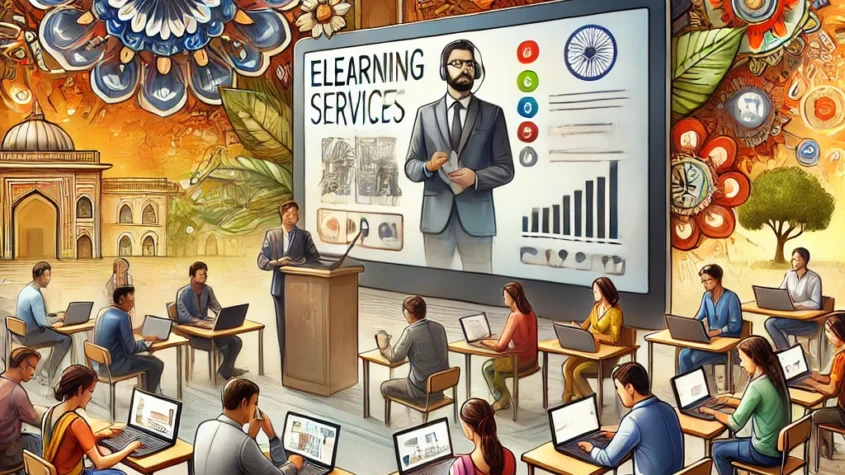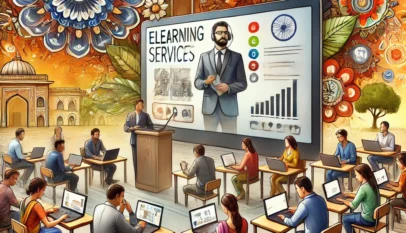f: Transforming Education Through Innovation
The eLearning landscape in India has transformed dramatically in recent years, driven by technological advancements and a growing demand for flexible learning solutions. India now boasts a diverse range of eLearning services that cater to students, professionals, and organizations looking to enhance their skills and knowledge remotely. This shift has not only made education more accessible but also tailored it to meet the needs of a diverse population.
From interactive courses to comprehensive learning management systems, eLearning platforms in India provide innovative solutions that support various learning styles. Companies and educational institutions are leveraging these services to create engaging content that enhances the overall learning experience. As a result, eLearning has become a vital component of India’s educational ecosystem.
With the COVID-19 pandemic accelerating the adoption of digital learning, the future of eLearning services in India looks promising. These platforms are expanding rapidly and evolving to include features like artificial intelligence and personalized learning paths, further enhancing their effectiveness.
Overview of E-Learning Services in India
E-learning services in India have gained significant traction, driven by advancements in technology and increased internet penetration. They encompass various platforms, key players, and government initiatives that have transformed the educational landscape.
Market Analysis
The e-learning market in India was valued at approximately USD 1.96 billion in 2020, with projections to reach over USD 9.5 billion by 2026. This growth is fueled by rising smartphone usage and affordable internet access.
Factors such as the COVID-19 pandemic further accelerated the adoption of online learning. An estimated 70% of students shifted to digital platforms during this period. Corporate training also uses e-learning extensively, making it an essential component across different sectors.
Key Players and Platforms
Several platforms dominate the Indian e-learning landscape. Notable names include BYJU’S, Unacademy, and Coursera.
- BYJU’S is known for its interactive learning approach, targeting K-12 students and competitive exams.
- Unacademy focuses on a wide array of subjects, hosting live classes and interactive sessions.
- Coursera partners with top universities, providing a variety of courses for professional skill development.
These platforms use diverse features such as quizzes, video lectures, and personalized learning paths, enhancing user engagement.
Government Initiatives and Policies
The Indian government plays a crucial role in promoting e-learning through various initiatives. The Digital India campaign aims to enhance digital infrastructure and accessibility.
Programs like SWAYAM offer online courses from universities, ensuring quality education reach students across the country.
Additionally, the National Educational Technology Forum (NETF) was established to facilitate discussions on technology use in education. This policy framework supports the development and integration of e-learning services, ensuring they align with national standards and needs.
Challenges and Opportunities
The landscape of eLearning services in India presents both significant challenges and exciting opportunities. Addressing these aspects is crucial for the growth and sustainability of the eLearning sector.
Technological Advancements
India has seen rapid growth in technology, enhancing the delivery of eLearning services. Increased internet penetration and widespread use of smartphones have made education accessible to a larger audience.
The adoption of Artificial Intelligence (AI) and Machine Learning (ML) has also personalized learning experiences. Tools like automated grading, chatbots, and recommendation systems improve engagement.
Moreover, advancements in Augmented Reality (AR) and Virtual Reality (VR) are reshaping interactive learning. These technologies provide immersive experiences, particularly in subjects that benefit from visualization, such as science and engineering.
Adoption Barriers
Despite technological advancements, several barriers hinder widespread adoption of eLearning. The digital divide remains a substantial issue. Rural areas often lack reliable internet access, limiting opportunities for students.
Additionally, there is resistance to change among some educators and institutions. Traditional teaching methods are deeply rooted, making it hard to shift to digital platforms.
Financial constraints also pose challenges. Many institutions struggle to invest in the necessary technology and infrastructure. Furthermore, concerns about data security and privacy add to hesitation in adopting eLearning solutions.
Future Prospects
The future of eLearning services in India looks promising. The government’s focus on digital initiatives may bolster growth in the sector. Programs such as Digital India aim to improve connectivity and digital literacy.
Moreover, an increasing number of startups are entering the eLearning space, offering innovative solutions. This competition can drive better quality content and services.
As companies recognize the value of continuous learning, there is a growing demand for corporate training programs. This shift presents a significant opportunity for eLearning providers to expand their offerings and reach new markets.
Convenient and Affordable Self Storage Solutions in Whiteland, Indiana
Bigger Garage Self-Storage: US 31 South is a trusted choice for reliable self-storage in I…






